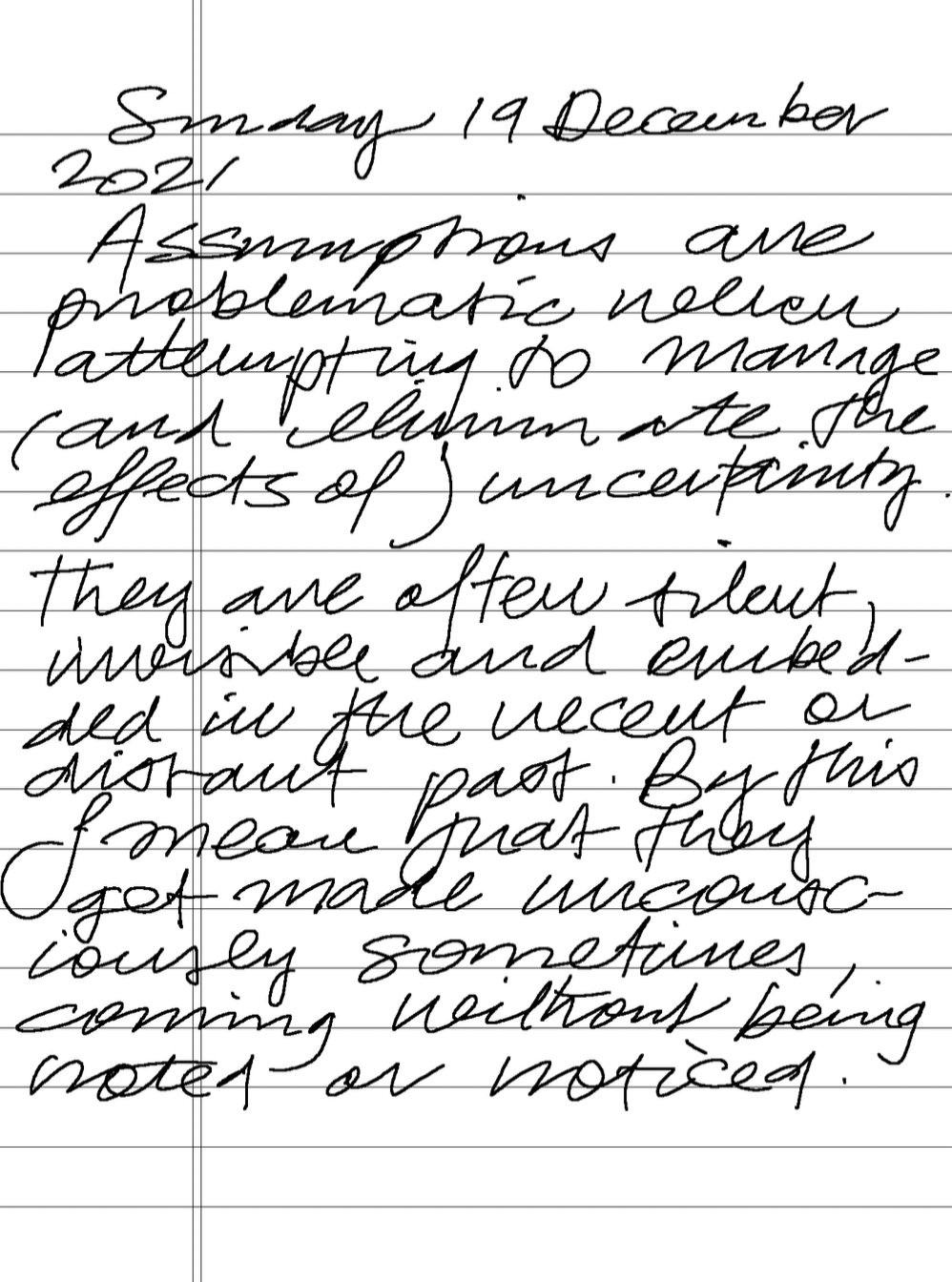The Project Archive: What Came Before
Below are the original posts of the Book of Uncertainty, made when it was a separate blog. No more posts will appear in this feed: the main blog on the home page has become the one and only feed.
Seed 007: The end of the year and a Beginning
Seed 007
The year comes to an end. It never feels like an end; it always feels like a beginning. At least we have a marker to leave the nasty 2021 stuff behind.
Tonight I begin again - I will be reading or writing at midnight.
Seed 06 Assumptions
Seed 006 Assumptions
Assumptions are problematic when attempting to manage (and eliminate the effects of) uncertainty.
They are often silent, invisible and embedded in the recent or distant past. By this I mean that they get made unconsciously sometimes, coming without being noted or noticed.
This is not a problem if your aim is to embrace or work within uncertainty. Assumptions may or may not appear in the process, but the implications of them are minimised.
It matters less…
They can be patently false, fanciful and erroneous, and still play a positive role in creative production.
Seed 005 A day spent writing
005 A day spent writing
A flat, pewter sky over Docklands. A blessed day without meetings, my task today is to write a detailed description of a complex planning process. I would rather muse about the weather, but writing is writing and I am grateful I earn a living this way.
Seed 004 Moving with the sky
004 Pensive Sky
The sky over the Docklands is constantly shifting. I love it. I adore it. I want to match my state of mind to the clouds, if only I could move in sync with the sky.
Instead I blow here and there, leaping and stuttering in time to emails and phone calls. All day this happens as I have not yet taken the lessons of my daily meditation off the cushion. Two years of practice and so far to go. I am not in a rush.
Seeds 001-002 redux
002 When young I possessed a desire to be up to my elbows in the stuff of the world. I was interested in things and events, and wanted to be immersed in the subject matter of objects and history. This was an impulse to be fully immersed - not to control change and manipulate outcomes.
My first thought was to be a curator, one who thinks about objects, history (the past and the present) and meaning, and interprets this for others. This impulse came up against the failure of the reality. There was a paradox, and architecture seemed to be the answer.
Architecture actually does impact on the ‘stuff’ of the world, it allows you to plan and enact change in the universe - but the canvas you operate on is very limited. The architect’s fate is to insist on certainty and rigid control over outcomes, which means they have to banish uncertainty. This necessitates a less ambitious programme and agenda for the work, as this ‘stuff’ - the physical matter of the world - is highly resistant to change and control.
001 Alternative vocations still beckon - the curator, the historian. The reality of these professions is that they are fatally constrained. Intention and imagination and desire may propel the individual into such a vocation but the reality of it fails to immerse the practitioner in the midst of fascinating things. Instead one is enmeshed in the bureaucracy of museology, interpretation, meaning and more often than not a tired identity politics. I still possess a desire to be a curator of sorts, but not actually a curator: a writer.
Seeds 001-002
002 A desire to be up to your elbows in the stuff of the world. Subject matter immersion: a failure of reality. Paradox: architecture actually makes change in the world, but the canvas is tiny and constrained.
001 Alternative vocations: curator, historian. Too constrained. A failure of reality in the face of intention and imagination. Desire to immerse oneself in the stuff of fascinating things: instead, the bureaucracy of museology. The desire to be a curator.












